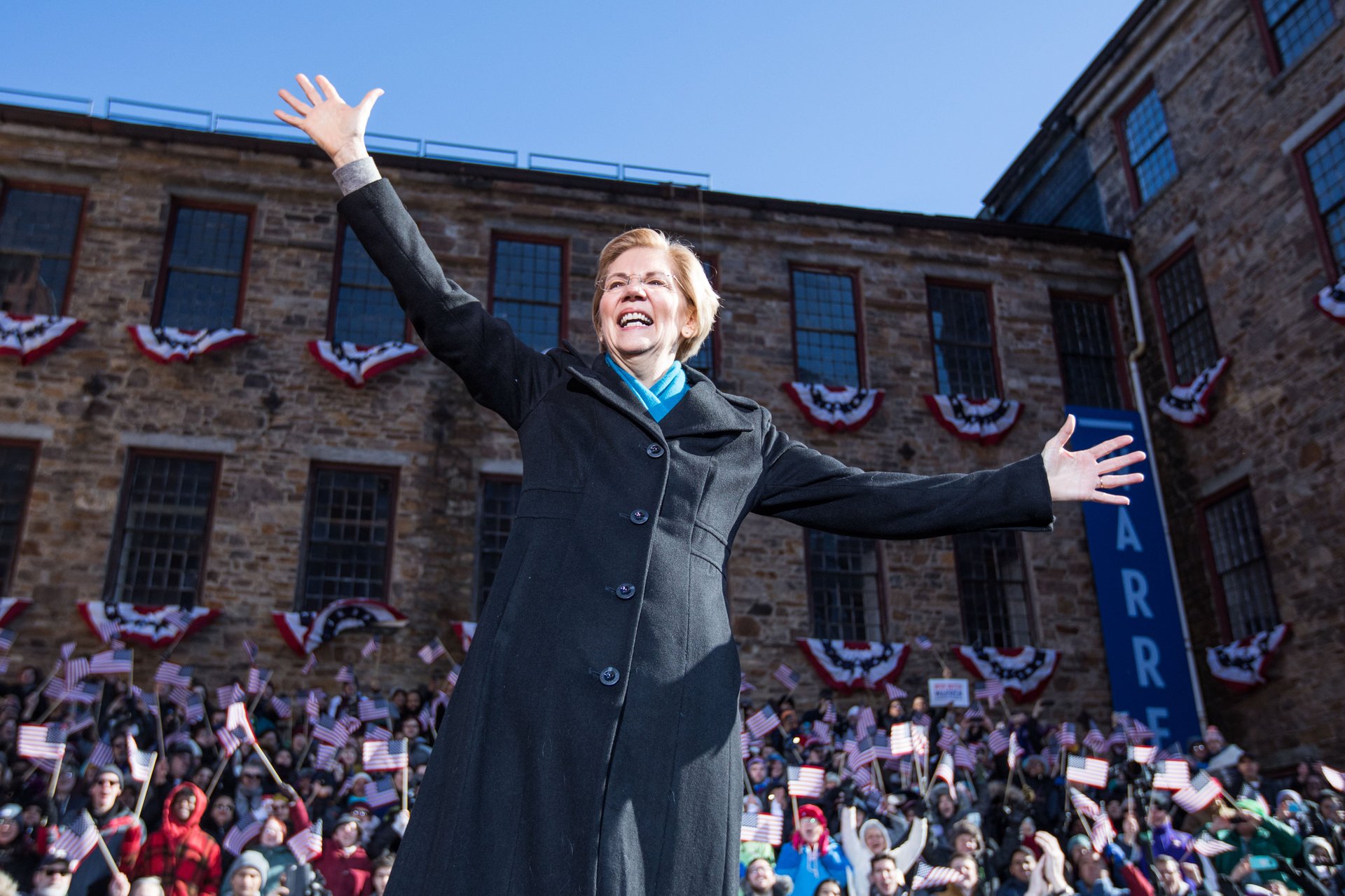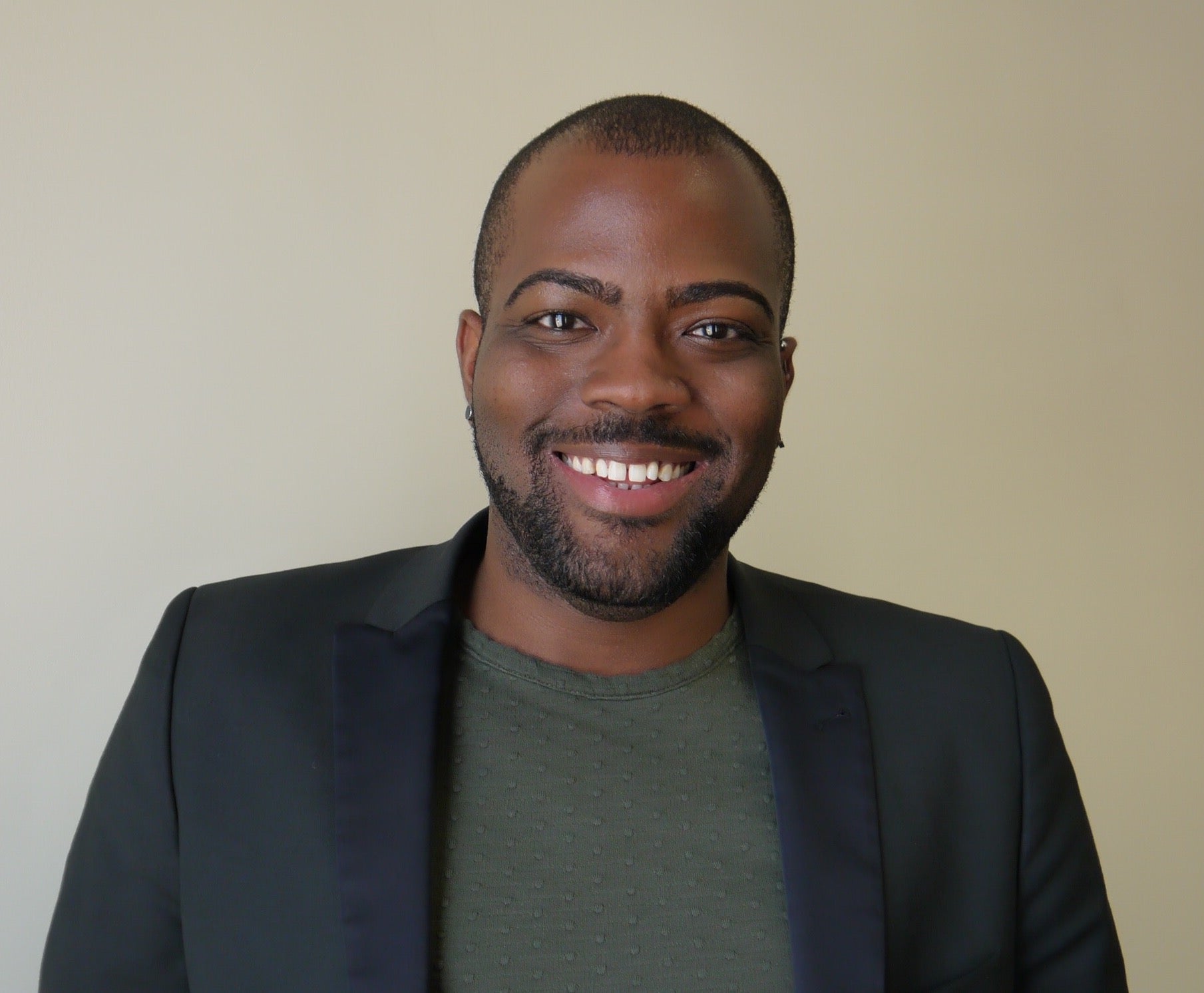Beyond Electability: How to give female presidential candidates the attention they deserve
This piece was created in partnership with Breakthrough, a global human rights organization that aims to reduce violence and discrimination using media, arts, and tech. Learn more here.



This piece was created in partnership with Breakthrough, a global human rights organization that aims to reduce violence and discrimination using media, arts, and tech. Learn more here.
Picture a presidential candidate. Odds are, the first image that popped into your mind was that of a man—and that man was likely white, cisgender, straight, monied, Christian, and able-bodied.
That is why it is not surprising that 14 of the 24 individuals who have declared their candidacy for the Democratic presidential nomination are white men. Or why 44 of our 45 Presidents throughout the history of the US have been white men. When it comes to who gets the most attention within the public square and media, however, there’s more at play than optics. Our ideas regarding who is becoming of the highest elected office and leadership in the U.S. are twisted by patriarchal norms.
“Electability is the language of power and privilege designed to preserve the political status quo,” Timothy McCarthy, Harvard University professor of politics and social movements, wrote me via email. “If ‘electability’ is the only metric, straight white men will always be the only people who meet that standard.”
Many of us in the US uphold straight white men as paragons of electoral leadership. We see them as electable, even if women contenders have more experience or outperform them in debates.
“It seems as though the women presidential candidates have perhaps felt the weight of dated societal norms and expectations that privilege men,” Ravi Perry, professor of political science at Virginia Commonwealth University, wrote me via email. “Women have been put in the position of having detailed proposals this early in the election season—a full 18 months until the election. All of this advanced preparation just to combat the sexist norm in politics that women can’t win and women can’t lead.”
Perry’s assertion has merit. Data from the Pew Research Center, for example, showed that 52% of men who voted in the 2016 presidential election voted for Donald Trump. They were overwhelmingly white and mostly over the age of 65. We all know what happened next—Trump won, despite the fact that Hillary Clinton, his contender, had more experience in government and who outgoing president Barack Obama called “the most qualified” candidate ever.
We’ve made progress since then—newly-elected representatives in the House are more diverse than they have ever been. But now, as we’re gearing up for the 2020 election, the rhetoric around the candidates for the nation’s highest office seems all too reminiscent of 2016. It is likely that some women and people of color might actually vote against their own interests because of their investment, or deep faith, in the status quo—namely, a particular type of charismatic white male leadership.
But the country is different now. It’s more diverse, and rights people hold dear are facing renewed challenges. It’s time to vote with the safety of the marginalized in mind.
“We cannot afford to elect another straight white man to be President of the United States,” McCarthy wrote me. “Since the birth of the nation—with one audacious exception—this has been an American tradition, and both political parties have been guilty of this ancient practice. Enough!”
We asked seven men to think about why male presidential candidates continue to receive the type of attention and support that women candidates do not. We asked them whether it’s time to reconsider the “American tradition” that McCarthy critiques, what that will look like, and how to get more people to focus on the merits and platforms of women candidates.

Ibram X. Kendi, professor and director, The Antiracist Research & Policy Center and author of Stamped From The Beginning
I often talk about Americans denying their own racism, but male Democrats also deny how their sexism may be fueling what candidates they support and pay attention to. Instead of confessing, “I can’t bring myself to support a woman,” these men say, “I’m supporting this man because a woman can’t beat Trump because voters won’t elect a woman as they showed in 2016.” A woman would be president of the United States if not for voter suppression. Enough voters are ready even if these men are not.
The next president of the United States should be anyone but a white man. This isn’t the same framing as “anyone but Trump,” but instead a rightful refusal to vote for 97% of the growing number of Democratic candidates. Sexism in elections is as American as apple pie. It does not escape me that states like Georgia, Alabama, Missouri, and Louisiana, among others, have passed (or are gearing up to pass) anti-abortion measures that will impact people with uteruses, including trans and non-binary individuals. Those leading the fight on the conservative side are white men, so to vote for business-as-usual candidates who aren’t impacted by these restrictive measures is counterproductive and violently sexist.

Christian Fuscarino, executive director of Garden State Equality and founder of The Pride Network
When issues, solutions, and policies are reduced to sound bites, there is no time for critical thinking. Fundamental regions of the brain are activated, and along with them, the fundamental collective experience, which is steeped in institutional patriarchy. Only through education, the promotion of critical thinking skills, and the constant reinforcement that egalitarianism hurts no one, will the sexism inherent in every one of our institutions, especially politics, be corrected.

Rashad Robinson, president of Color Of Change, the largest online racial justice organization in the US
If male candidates are getting a different type of attention, the reason why is simple: We’re giving it to them. The question is how much of that is just bad behavior—playing into stereotypes, passing along a rumor you know you shouldn’t, holding people to different standards, forgiving men for faults we don’t forgive women for. Media executives who influence even what everyday people share [on social media] and think is cool and talk about, let alone the news cycle. While there’s a lot of bad behavior, nothing will change if we don’t look at the incentives. We must change them. The same incentives that drove media executives to billions of dollars of free advertising to Trump in 2016 are still in place, and those executives still have their jobs. So we should not be surprised to see bias. They decided ad dollars were more important than anything else, whether or not the source of that profit was racism and sexism.

Timothy Patrick McCarthy, historian of politics and social movements at Kennedy School’s Carr Center for Human Rights Policy at Harvard University
Given the recent tectonic shifts across the political spectrum—Republicans fully complicit in the descent into authoritarianism, Democrats warring fiercely for their soul—it’s time for all of us to be bigger, bolder, and braver than we’ve ever been. Electorally, this means doing several things. First, we need to take seriously, support generously, and vote reliably for women candidates for office, including the many different women running for president. Second, we need to denounce the misogyny and other mainstream media biases and use whatever influence we have—including social media power—to promote women, people of color, LGBTQ, and working-class folks who are running for office. Third, we need to stop framing politics in terms of “electability.”

Ravi K. Perry, professor of political science at Virginia Commonwealth University; former president, Association for Ethnic Studies
We have to push media to cover the campaigns of women presidential candidates. We must push stories to mainstream outlets that cover the experiences of women politicians seeking our votes. We should not only be willing to share those stories, but we should feel as though it is necessary to privilege the voices of women in our national policy discussions and political circles. The continued presence of candidates who defy the norm in national media circles (to the extent that the media is willing to cover them) contributes to the normalization of attitudes and feelings about those populations. That’s a good thing. It’s good for American culture, for American politics, and ultimately it’s good for the future of the country. Equitable coverage of the campaigns of women presidential candidates would go a long way toward the prospect of electing a woman as the next president of the United States.

Thomas Page McBee, author of Man Alive: A True Story of Violence, Forgiveness and Becoming a Man
We are living in an era that future generations (if we can eradicate harmful gendered behaviors in time) will define by the phrases “toxic masculinity” and “white supremacy.” The need for change has never been clearer or more urgent, and yet we can’t rely on media to overcome its own entrenched biases long enough to discuss it. The current focus on “electability” is proof of it. We need to recognize the sexist and racist connotations of that word. We need to pay special attention to women, people of color, and LGBTQ candidates. We need to ask who benefits from the idea of “electability.” We need to ask if we want to maintain the status quo, and what it would take to truly change it. I mean, who do you want to have a beer with? I want to have a beer with someone who knows that our environment and our bodies are under attack at our borders, in our bathrooms and prisons, and at traffic stops across America, and has the courage and the will to finally, finally stop it.
This story is part of How We’ll Win in 2019, a year-long exploration of the fight for gender equality. Read more stories here.
